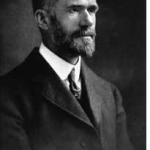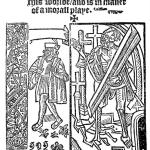The Kingdom of God as Critical Principle for Christian Social Ethics: The Church
The Maston Lectures (Lecture 1)
East Texas Baptist University
April 13, 2016
Roger E. Olson
“That action is right which fits the shape of the Kingdom to come.” John Howard Yoder
Jesus said to his disciples “Seek ye first the kingdom of God and his righteousness and all these things shall be added unto you.” (John 6:33) Partly because of this somewhat enigmatic imperative, Christian theologians and ethicists have for centuries regarded the kingdom of God as the heart of Christian ethics. What are Christians to do besides repent and believe in Jesus Christ? What is the “good life,” according to Jesus himself? Seek God’s kingdom.
The imperative has given rise to many questions. First, and perhaps most important: What is “the kingdom of God?” Second, and perhaps equally important: “What does “seek” mean with regard to the kingdom of God? Most biblical scholars and theologians assume that “his righteousness,” that is, “God’s righteousness,” refers to the kingdom of God; it is an example of Hebrew parallelism. God’s righteousness, some would say “justice,” will come with God’s kingdom.
So, according to Jesus, we, his people, his followers, are to be seeking God’s kingdom—whatever that means. Our ethical task is to seek and, presumably find, God’s kingdom in and with which God’s righteousness, justice, will appear. That is our “first” task—our ethical imperative above all others, crucial to being disciples of Jesus.
But wait. If this is so important, why didn’t Jesus somewhere clearly and unequivocally define “the kingdom of God” for us? Of course, some think he did. But where? He uttered many parables about it, but nowhere in the New Testament is a clear, unequivocal definition of “kingdom of God” recorded in the way we think we need. This has given rise to numerous theological theories and Christian ethical interpretations of “kingdom of God.” Which one is right? All, or at least most, seem to have some validity; they can point to biblical passages and say “There! That’s what ‘kingdom of God’ means. It’s says so right there.”
In spite of apparent “pervasive interpretive pluralism,” however, a rough consensus seems to have emerged in the past century. By “consensus” I do not mean “unanimous agreement;” that would be too much to expect—given our human frailty when it comes to interpreting Scripture. At the beginning of every theology course I tell my students that, unfortunately, Scripture is not as clear as we wish it were—about many things. This is why we have theologians; it keeps us working. But I do not mean that Scripture is obscure, opaque, oblique, impenetrable, esoteric or so diverse as to be useless. What Jesus meant by “kingdom of God” may be debatable, but for the most part, except around the edges, it is clear.
A century ago Baptist theologian Walter Rauschenbusch published his classic exposition of the kingdom of God entitled A Theology for the Social Gospel (1917). Around the same time, completely unknown to Rauschenbusch, so far as anyone knows, anyway, in Bad Boll, Germany, Lutheran Pietist minister, revivalist, faith-healer, exorcist, premillennialist, pacifist, socialist, universalist Christoph Blumhardt was expounding a similar vision of the kingdom of God. Their common breakthrough, as it were, in explaining and proclaiming the kingdom of God, was the kingdom of God as new social order organized according to love. For Rauschenbusch, it would come about through Christian activism in transforming the social order. For Blumhardt, it would come about through God’s supernatural intervention in world history to establish Jesus’ long-awaited messianic reign, but it would be a new social order manifesting love.
Both Rauschenbusch and Blumhardt were, in separate ways and differently, influenced by the great German liberal theologian Albrecht Ritschl who fifty years earlier had defined the kingdom of God as “society organized according to love.” However, Rauschenbusch and Blumhardt radically departed from Ritschl for whom the kingdom of God was identified with Prussian culture at its best. For Rauschenbusch and Blumhardt, the kingdom of God is eschatological and not to be identified with any human nation-state, although both, in their own ways, were prone to allow their cultures to infect their visions of God’s kingdom.
For a century, now, Christian theologians and ethicists have largely agreed that Jesus’s vision of the kingdom of God was of a new social order he inaugurated. It had old covenant roots in God’s ideal plan for Israel and was prophesied by Isaiah and other Hebrew prophets, but Jesus established it in himself and among his disciples. The Sermon on the Mount is its “charter.” Love is its driving motive and ethical impulse. Justice for all is its concrete evidence. It is an “upside down” kingdom in which, unlike any humanly-established social order, the meek and the weak, the least advantaged, those at the bottom of the social pyramid, are first and most important—in the sense of being cared for by everyone.
The greatest American theological ethicist, Reinhold Niebuhr, was reluctant to use “kingdom of God” as the heart of Christian social ethics because of the pacifism and inherent optimism of the Social Gospel Movement represented by Rauschenbusch and many others of the late nineteenth and early twentieth centuries. Nevertheless, even he could not deny that “kingdom of God” is central to Jesus’s ethical vision and that it would be, if ever experienced, a new and vital social order where love and justice reign. He simply wanted to emphasize that the kingdom of God is unachievable by human efforts of social transformation; it is gift, not achievement. I’m not at all sure Rauschenbusch would have disagreed had he lived long enough to debate Niebuhr. I think he would have added that we are to do our best to approximate the kingdom of God which, he admitted, is “always but coming.”
In 1972 Mennonite theologian and social ethicist John Howard Yoder published his own contribution to the consensus about the kingdom of God entitled The Politics of Jesus. He revised it, taking criticisms into account, in 1994. It was a critique especially of Niebuhr’s rejection of the Sermon on the Mount as a relevant and possible foundation for Christian social ethics. It was also, implicitly, at least, a critique of Rauschenbusch’s Social Gospel insofar as that relied on political ideology, socialism, and social action, direct involvement in secular politics, to seek and establish the kingdom of God. According to Yoder, the kingdom of God proclaimed and inaugurated by Jesus, is a new social order marked especially by nonviolence and “revolutionary subordination” of people to each other—for the common good.
In 1991 Christian ethicist Stanley Hauerwas published The Peaceable Kingdom—building on and developing further Yoder’s vision of the kingdom of God as a nonviolent community of reconciled and reconciling people among whom God is “busy.”
Here I’ve only mentioned a few of the most notable voices of this century-long rough consensus about the kingdom of God according to Jesus. The consensus is not perfectly harmonious; there are strong notes of dissonance in the choir. But there is also harmony around certain crucial themes.
First, the kingdom of God was inaugurated by Jesus even if it was foreshadowed by prophets, judges and kings under the old covenant. Second, Jesus was and is the embodiment of the kingdom of God. Third, the kingdom of God is a gift with a task; God gives it and his people are to seek it. Fourth, “seeking the kingdom” involves action, not passivity; it is a gift to be received through active participation and involvement. Fifth, the kingdom of God is ultimately eschatological; its fullness is yet to come in the eschatological consummation; it is hope. Sixth, the kingdom of God is “already but not yet”; it exists now “between the times” of its inauguration and its fulfillment. Seventh, the kingdom of God is a new, divine social order. Eighth, this new divine social order is radically counter-cultural; it is alternative to all human-created social orders. Ninth, the kingdom of God is somehow related to the church; the church is intended by Jesus to be the anticipatory, proleptic social realization of God’s eschatological, messianic order. Tenth, the kingdom of God is, in the inimitable words of Donald Kraybill, “upside down;” a social order organized reversely to all solely human-created social orders.
Now, of course, there are Christian social ethicists who disagree with one, two or three, perhaps more, of those ten points, but most of the current discussion about the kingdom of God among Christian scholars surrounds the precise meanings of these points.
Questions remain and are hotly debated. For example, in his recent book The Kingdom Conspiracy (2014) evangelical New Testament scholar-turned-theologian Scot McKnight argues that the kingdom of God now, within history, is inseparable from the local church. The local church, he argues, is the kingdom of God inaugurated by Jesus. Of course, he does not mean any particular local church; he means the network of local bodies of Christ that, together, make up the universal body of Christ, the church in the world. His point is that “kingdom work” is not every “good work” Christians engage in. Rather, “kingdom work” is always work, mission, carried out within the context of the church. That thesis has sparked a new controversy even among those of us who embrace the ten-point consensus outlined before.
Another debate among consensus theologians has to do with “realism”—what is the difference between “kingdom ethics” now, the anticipation, prolepsis, of the future messianic kingdom after Jesus returns, and what will be the case then? In other words, does “seeking the kingdom” now require nonviolence or does the “not yetness” of the kingdom, surrounded by horrific injustices such as genocide, permit kingdom people to fight for justice? Liberation theologians especially often argue that, until Christ returns and the kingdom is made perfect, seeking God’s kingdom and his righteousness sometimes involves participation in force, even violence. Yoder, Hauerwas and their followers condemn such as compromise at best, denial of Jesus as lord and king at worst.
Such debates will always and forever continue because, unfortunately, Jesus himself and the New Testament writers, did not settle every question about the kingdom of God. However, it seems to me, the emergence of the ten point consensus I outlined above is a significant achievement of the last century in Christian thought.
What are the contexts in which “seeking the kingdom of God” is most crucial, at least for Christian social ethics? Well, two should be most obvious: the church and the state. Without in the least denying that individuals can and should seek the kingdom of God, I will dare to assert that the greatest challenges and opportunities for seeking and receiving the kingdom of God as gift, as well as what I will call “tasking” the kingdom of God, appear in the contexts of church and polis—state. By “tasking” the kingdom of God I mean doing what can be done with God’s help to anticipate the eschatological fullness and perfection of God’s kingdom and bring forth as much as possible in this world before then the kingdom of God inaugurated by Jesus.
Let me explain with an analogy. Sanctification, becoming holy, is both gift and task according to Paul in Philippians 2:12-13: “Work out your own salvation with fear and trembling for God is at work in you to will and to do for his good pleasure.” The English word “work” appears twice there. In one case it is our work; it the other it is God’s work. However, Paul wrote in Greek and these two “works” translate two different Greek words. One means “carry to completion” and then other means “to enable.” Swiss theologian Emil Brunner often referred to sanctification as Gabe und Aufgabe—gift and task. Sanctification is God’s work in us; God gives all that is needed to continue on toward perfection. Gift. Sanctification is also our work; we are to make full use of God’s gift by never giving up but using God’s empowering presence to become holy. It is a synergistic process with God’s gift as primary and our task as secondary but necessary. God will not make us holy without our cooperation.
So the kingdom of God now, within world history, between the times, in the “not yet” condition, is both gift and task. Nowhere does Scripture command us to “build the kingdom of God”—a favorite but theologically mistaken imperative of preachers to congregations. Building the kingdom of God is God’s task; ours is to seek and receive it. But seeking and receiving it involves cooperation with God through the means God has provided including especially prayer—“Thy kingdom come”—but also work—“work…for the night is coming” (John 9:4).
Assuming with the scholarly consensus that the kingdom of God is a new social order inaugurated by Jesus, what tasks are we to engage in in the contexts of church and state? In this talk I will focus on church; in the second I will focus on state.
Before becoming fine grained about the kingdom of God and the church, I will set forth some general assumptions that form my guiding principles for Christian ethics in relation to the church.
First, while agreeing with McKnight and others that the church is a crucial aspect of the kingdom of God now, within history, between the times, I do not agree that the visible, institutional, local church, or any denomination, or even the universal, invisible body of Christ made up of all God’s faithful people, is the kingdom of God exclusively and entirely. What I am rejecting is identity between kingdom of God and church. The kingdom of God is bigger, wider than that—unless one simply defines “church” as wherever God’s righteous will is being done. Jesus’ “disciples prayer”—the one taught to the disciples that we call “the Lord’s prayer”—includes the petition “Thy kingdom come, they will be done, on earth as it is in heaven.” Surely this points to the fact that Jesus regarded the presence of the kingdom as wherever God’s will is being done on earth as in heaven. Surely we must make a distinction between the kingdom of God abroad, outside the organized church, and the kingdom of God within, inside and among Jesus’s followers, the church. Jesus said to the disciples “The kingdom of God is among you.” (Luke 17:21) And yet he said in the same context that the kingdom of God is not “here or there,” meaning wherever “men” say it is. How to put it all together? The only way to make sense of the relationship between the kingdom of God and the church is to say this: The church, visible, institutional but also universal and invisible, is meant by Jesus to be the anticipatory embodiment of the kingdom of God that will become perfect, complete, in his messianic reign when he returns.
Second, if that is true, then the church here and now, between the times, ought first and foremost to become itself as witness to the world by example of God’s willed new social order. The first task of the church is to be the church. To be the church is to anticipate in present, concrete social order the social order of the future when Christ will reign on earth.
Third, we are given pictures of that future messianic social order in Scripture. Isaiah 65, which most “study Bibles” treat as referring to the “new heaven and new earth,” can only be a description of an earthly messianic reign of love and justice. It includes the description that a man who dies at one hundred years of age will be considered to have died young. Clearly, then, that and parallel passages in the prophets—about a future messianic reign on earth—are pointing forward to a what Jürgen Moltmann calls a “historical millennium” before the new heaven and new earth. Among other things, according to Isaiah 65, that will be a social order within time, of perfect sufficiency in which people will sit under their own olive trees and not toil and labor for another. In other words, a social order of enough for everyone to live a humanly fulfilled life without need.
Fourth, the new, divine social order of the kingdom of God, which the church ought to prefigure by anticipation, is one in which the “least” are “first” and no one is privileged by status over others—an “upside down kingdom” without systems of caste or status except that everyone looks out for and helps lift up, empower, the weak. The only privileged class is the weak, the disadvantaged. Matthew 20:24-28 and cognate passages prove this; there and in them Jesus clearly privileges among his disciples the weakest, the least in terms of worldly status.
Fifth, the kingdom of God, which the church ought to anticipate concretely in terms of its form of life, its customs and habits, its ethos, is “not of this world.” (John 18:36) What did Jesus mean? “World,” in this context and most others in the New Testament, referred not to the physical world of nature but to the social systems created by humanity—especially the all-pervasive “domination system” identified by theologian Walter Wink in which a few powerful individuals and groups, oligarchies, rule over others by determining their lives, keeping them from experiencing complete, fulfilled human existence. The kingdom of God is not like that, nor should the church mirror it. The church should be, like the kingdom of God between the times, “in but not of the world.” In other words, surrounded by the fallen domination systems ruled by powers and principalities but not reflecting them in its form of life.
Sixth, if the church is going to be the anticipatory presence of the messianic kingdom of God inaugurated by Jesus to be consummated at his coming, the church must be always countercultural in terms of its posture, its stance in relation to everything truly “worldly”—all that stands in contrast to and contradiction of God’s upside down kingdom. In other words, it ought to eschew cultural accommodation, respectability in the eyes of the world, complacency and comfort, and ought to practice a prophetic lifestyle that shows the world itself—what it is: fallen and corrupt and out of synchronicity with God’s will for righteousness. Stanley Hauerwas has famously declared that a major task of the church is to tell the world what it, the world, is. It is out of order—broken. Insofar as the church is also broken it cannot fulfill its mission to the world. The church, in order to be the church, the historical anticipatory presence of the kingdom of God, must be healed of its brokenness. Of course, because the perfection of God’s kingdom is not yet, there will always be brokenness, but that is not the same as being “broken.” The church is broken when it is culturally accommodated, complacent and comfortable, in harmony with the world, reflecting the world’s brokenness.
Seventh and finally, ethically, I, as a disciple of Christ, seeking the kingdom of God and his righteousness, and we, the church, the historical anticipatory presence of the future kingdom of God, cannot be comfortable with anything that will not be present then and there—when and where the Messiah rules and reigns. In other words, if we cannot picture something as part of God’s righteous social order in Jesus’s messianic kingdom when he returns, then we cannot, must not, embrace it complacently and refuse or even neglect to protest it among ourselves and even in our polis, our city, state and nation.
These are my seven guiding ethical presuppositions and principles for Christian social ethics as applied to the church, the body of Christ.
Now, to application, to meddling.
Sadly, to a very great extent, the American church, American churches of all denominations, are greatly immersed in cultural accommodation. Some years ago American sociologist of religion Dean Hoge, author of Division in the Protestant House, a critique of American Christianity, wrote that “For the typical Protestant church member [middle class commitments to family, career, and standard of living] are so strong that church commitment is largely instrumental to them and contingent on whether the church appears to serve them. As a result, many local churches tend to become instruments for achieving middle class interests, whether or not these interests can be defended in New Testament terms.” This was simply concrete confirmation of something Karl Barth wrote decades earlier in Church Dogmatics: “When the gospel is offered to man, and he stretches out his hand to receive it and takes it into his hand, an acute danger arise which is greater than the danger that he may not understand it and angrily reject it. The danger is that he may accept it peacefully and at once make himself its lord and possessor, thus rendering it innocuous, making that which chooses him something which he himself has chosen, which therefore comes to stand as such alongside all the other things that he can also choose, and therefore control. … Wherever the gospel is proclaimed…it is exposed at once to the danger of respectability.”
For the church to be ethically sound in terms of the kingdom of God, if it is to be what it is called to be, the prolepsis of that future kingdom, the anticipatory presence in the world of the messianic reign of Jesus, it must shake off and resist, abandon and renounce, cultural accommodation for the sake of respectability. For many churches, perhaps the majority, this will require a new consciousness, a new ethos of being alternative to the social reality surrounding them. Hauerwas and William Willimon have labeled this new consciousness “the Christian colony” within the world. They mean that the American church, like Jesus and his disciples, like the Christian churches of the Roman Empire, like the Anabaptists of the Holy Roman Empire, like the Confessing Church of Germany in the 1930s, must begin to see itself as countercultural no matter what the culture around it is like. To paraphrase from Theodore Geisel, “Dr. Seuss,” the church’s job in every culture is not to “fit in but to stand out.”
Our particular cultural context is America and especially Texas. Many Christians in our cultural context have come to think that, at some time and still in some ways, our culture is already Christianized which is as much as to say it is the realization of God’s kingdom on earth. Many “culture warrior” Christians, of course, target particular threats to that Christ and culture synthesis—abortion, homosexuality, pornography and the teaching of evolution in schools. The great irony is that in many churches populated by them, capital punishment, divorce, lascivious entertainment, gambling and Social Darwinism are accepted as normal if not actually good.
If our American churches are to be what they are called to be, anticipations of the kingdom of God, they must examine themselves in terms of their whole posture toward culture. Embracing a secular social and political ideology is also a form of cultural accommodation. To a very large extent secular-minded, godless political powers have co-opted both conservative and liberal churches for their causes. The churches have too willingly, perhaps unknowingly, sacrificed their prophetic kingdom-centered consciousness and social order for participation in secular power politics gaining thereby a self-righteous self-image and respectability with some portion of the culture.
None of that is to say that churches ought never to speak prophetically to power; it is only to say that our first ethical task is to be witnesses to the world around us by being the church—the alternative social order Jesus inaugurated that he will install in the world when he returns.
To that end, here is what American churches must do.
First, we must eschew power-over and every shred of caste preference, privilege based on human advantages, and become churches of the poor. By “poor” I mean disadvantaged, weak, powerless, marginalized, unseen and unnoticed, passed over and ignored, downtrodden, despised, rejected and neglected. By “poor” I mean what Jesus meant by “meek” and “children” and “the least.”
A few years ago I was asked to guest preach at Waco’s “Church under the Bridge,” a church founded by Mission Waco’s Jimmy Dorrell for those in Waco who are not welcome in the rich and powerful churches, most of which have moved far out into the suburbs to get away from the homeless, the mentally ill, the hungry and wretched. It was chaotic. I preached to a motley crowd of society’s outcasts as eighteen wheelers rumbled overhead on I-35 and as cars of all kinds drove by on downtown streets, many of them honking their horns to disrupt our worship. While I preached a mentally challenged man stood between me and the congregation playing his “air guitar” and dancing around. A few blocks away churches populated mainly by the rich and powerful sat in comfortable pews singing hymns, their parking lots packed with Lexuses and BMWs.
On another occasion I took a class to Waco’s “Gospel Café” operated by Waco’s Crossties Ecumenical Church—congregation about fifteen members. The café and church exist in an old house located in the middle of the most crime-ridden neighborhood in all of Texas. Three days every week the members of the church and visiting guests from other churches serve hot meals to all comers—mostly homeless people, elderly people living on fixed incomes of less than a thousand dollars a month, and children without fathers. We sat among them and listened to them as they and we ate our casserole lunches together. Then we met with the pastor who told us about the “dignity of the poor” and how they are routinely harassed by the police just because they are poor. The church is noted in the community for holding the police accountable to treat the poor with dignity.
My own church in Temple, Texas opens its doors one week every month to feed and house homeless families in transition—mostly African-American and Hispanic. Members volunteer to cook for them and sleep overnight in the church with them, engaging their children in play and having conversations with them.
I ask myself “Where would Jesus go to church if he came to central Texas?” To put it another way, which churches are really being the presence of the upside-down kingdom Jesus inaugurated and that will be the social order of the whole world when Jesus returns?
Some years ago my family and I were members of a suburban Baptist church in Minnesota. When we joined the church, a state representative, member of the legislature, candidate for governor of the state, was a member together with his wife. It was obvious by the car they drove that they were extremely affluent. I noticed that many members of the congregation kowtowed to the power couple and became agitated and very upset when they left the church. I don’t know why they left. I asked some fellow church members why they were so disturbed and they said things like “What will become of our church without them here?” Their presence in the congregation had become a sign of status, of respectability.
“Seek ye first the kingdom of God and his righteousness” must at least mean becoming churches of the poor—as defined above. That does not necessarily mean worshiping under interstate overpasses, but it surely does mean eschewing privilege based on social status in the eyes of the fallen world and putting at our center of interest the lowly, the meek and neglected people whoever they may be in our particular neighborhood or town.
Second, American churches that want to obey Jesus’s command to seek first the kingdom of God and his righteousness must take a stand against unnecessary violence. When I think of the inauguration of God’s kingdom on earth with the appearing of the divine man who brought and taught peace, and when I think of the future perfection of God’s kingdom with the parousia of the same divine man who will enforce peace, I cannot reconcile myself as his follower to violence. Our world, even our culture, is saturated with violence, so saturated that we easily become inured to it and jaded by it. Churches of Jesus Christ, however, ought to be peace-loving and peace-making communities governed by a preferential option for peace. At the very least we ought to celebrate those among us who feel called to pacifism and conscientious objection to bearing arms in war.
Early Christians, between the primitive church of the New Testament and the rise of Constantine, highly valued peace and discouraged members from bearing arms. That was one reason for their persecution by the Roman Empire; for the most part, with some exceptions, bishops disciplined Christian men who joined the Roman legions and especially those who killed people. We know from church father John Chrysostom, the patriarch of Constantinople, for example, that Christian soldiers who killed in conflict were required to engage in lengthy penance before being readmitted to the table of communion.
The sad, realistic fact is that ours is such a broken world that using deadly force against those who rape and murder, the Nazis, ISIS and the Lord’s Resistance Army, to name three examples, is sometimes necessary. The movie “Machine Gun Preacher” provoked difficult emotions and thoughts in many of us who cannot picture Jesus shooting anyone, even the monsters of the LRA who kidnap children and force them to murder their parents. And yet, when confronted with the opportunity to do it, to rescue thousands of women and children from a madman and his murderous paramilitary thugs, who wouldn’t, even if it required using deadly force? Who wouldn’t use deadly force to stop a rapist from raping and possibly killing one’s wife or daughter?
I respect pacifists, but I know I’m not one. How do I know that? Because I know I would use deadly force to protect my granddaughter or grandson from a would-be rapist or murderer. On the other hand, I also believe it would be a sin. And, yet on the other hand, again, I believe God understands our frailty and the condition of our world and the need to protect the helpless innocents.
I do not think Christ expects his followers in this time between the times to eschew all violence; sometimes violence is a necessary evil and, when it is, God forgives. But that concession to Christian realism, to use the label attached to Christian ethicist Reinhold Niebuhr’s approach to Christian social ethics, does not give Christians license to celebrate violence as something beautiful and good. It does not belong in God’s kingdom and therefore cannot be celebrated, let alone encouraged.
A few years ago I attended the then largest church in my home state in the Upper Midwest. My best friend was on the church’s staff. It was the Sunday before Independence Day, July 4th, and, like many conservative evangelical churches, it devoted the entire Sunday morning worship service to a spectacular “God and country” celebration replete with uniformed flag and gun-bearing color guards of most of the branches of the U.S. military. A U.S. Senator prayed for our men and women in uniform, in harm’s way, and a band played the “hymns” of the various military branches as the color guards marched down the aisles of the packed sanctuary. The pastor invited members and visitors who had served in the various branches of the military to stand. I was not surprised, but I was dismayed, that there was no mention of conscientious objectors, nor were they invited to stand to be applauded.
Around the same time I happened to visit a Mennonite church on a Sunday evening. The entire service was led by a group representing the Mennonite Central Committee talking about peace-making efforts around the world including young men and women standing in the way of Israeli tanks in Palestine driving to destroy Palestinian families’ homes. One young woman of the Committee was run over by an Israeli tank and she was celebrated as a martyr. Then the group talked about ways in which Mennonite teenage boys, young men, should handle the requirement to register for the selective service.
Two churches poles apart on the issue of violence. My own youth pastor, when I was a teenager, had been a conscientious objector during the Korean conflict. He performed alternative service in the name of the Lamb who was sacrificed rather than fighting back against his killers. That same church, a few years later, fired another youth pastor who promoted pacifism—for promoting pacifism among the church’s young people.
It is highly unlikely that Christian churches will ever agree about violence, but surely we could at least agree that it is at best a necessary evil and not something to celebrate. Our model should be Dietrich Bonhoeffer who was a pacifist in the name of Jesus until he was offered the opportunity to participate in a plot to kill Hitler. According to him, as told to his student and friend, Eberhard Bethge, the duty of a peace-loving Christian who sees a madman driving a car into a crowd is not merely to go behind it picking up the wounded and dying, but to do all he can to get the driver out from behind the wheel. And yet, according to Bethge, Bonhoeffer never believed he was participating in a righteous cause, a crusade, because it involved conspiracy to commit murder even of one of history’s worst mass murderers.
I was saddened by the wild celebrations that took place all around our country, even by many Christians, the day our military killed Osama bin Laden and members of his family including his fourteen year old son. Relief that a madman is dead is one thing; celebration of bloody killing of anyone is something else.
The kingdom of God, as revealed by the prophets and inaugurated by Jesus must be our Christian critical principle, first and foremost for our churches and second for our cities, states and country. A critical principle is an ethical litmus test used to determine whether an action is right or wrong, good or bad. If we cannot imagine war and assassinations and even justified killing in the coming messianic kingdom of God, then we cannot be comfortable with it now or celebrate it now. And our churches ought to be communities of peace and peace-making, not launching pads for revolution or “salvation by military conquest”—the title of a book I saw in a Christian church bookstore in Houston some years ago. The book was the pastor’s commentary on the biblical book of Joshua and showed on its cover a photo of a fighter jet.
Third, and finally, given the limited time allotted to this lecture, American churches that want to obey Jesus’s command to seek first the kingdom of God and his righteousness must resist accommodation to the culture of individualistic consumerism and obsession with entertainment and develop true community within and among themselves. All too easily, without careful study of culture and conscious resistance to its deleterious allurements, churches fall into becoming mere mirrors of the culture around them. Our culture is obsessed with what my colleague Jim Roberts of Baylor’s School of Business calls, in the title of one of his books, “shiny objects.” Advertising is ubiquitous and manipulative; it lures us into its web of deceit to think that life will be fulfilled if we buy this designer brand of car or clothes. Shopping malls are our culture’s equivalents of Greek and Roman pagan temples. Every time I walk by a certain store that belongs to a chain of stores selling clothes to teens and young adults using half naked models I cannot help but think of the pagan temples of Corinth and other cities in the ancient world.
Television, movies and sports events have become our culture’s equivalents of the Roman circuses and gladiator contests in the arenas and coliseums of the ancient world.
Our culture worships designer clothes, expensive cars and the latest technologies for entertainment. These are our cultures gods.
Let’s use the critical principle of the messianic kingdom of God inaugurated by Jesus to be brought about on earth when Jesus returns as our litmus test for these things. The issue is not having clothes; the issue is spending much more than necessary just to have clothes that will impress people. The issue is not driving cars; the issue is spending many thousands of dollars just to have a car that will impress people. The issue is not television, movies or sports events, per se; the issue is how much time is devoted to them, what is being portrayed by them, and how controlling they become of our lives.
A few years ago I visited a church on Super Bowl Sunday. The pastor and deacons had brought a large screen television into the sanctuary and provided snacks because the pre-game festivities were to begin before the usual conclusion of the Sunday morning worship service. The whole community had been notified via advertising, which I missed because I arrived in the city late the night before, that those who attended worship that Sunday at that church could worship for thirty minutes and then stay seated, eat snacks in the sanctuary and watch the Super Bowl. The best of both worlds in one place and time. I left before the television was turned on.
In less extreme and obvious ways, unfortunately, we American Christians have largely succumbed in our churches, to the gods of our culture. We have adjusted to accommodate them. We have absorbed their worship often uncritically, even unconsciously because we do not use the kingdom of God as a critical principle in examining our culture and our churches’ behaviors. We often insist on uncritical adherence to traditional doctrines while uncritically absorbing the ways of the world, the culture, around us.
Christian visitors to our country, mostly students from Latin America, Africa and Asia, tell me they are shocked by American culture and American Christian churches’ accommodations to it. Two aspects of that accommodation especially stand out—individualism and entertainment. We call our sanctuaries “auditoriums,” our chancels “platforms” and often our services of worship are more performances than God-centered participations by the gathered priestly believers. The people gather for one hour on Sunday and go their separate ways, never really knowing each other, devoid of real community.
What does community necessarily entail? Three things at least: availability, accountability, and vulnerability. The earliest Christians shared their possessions with each other; ate together, were accountable not only to God but to each other, and confessed their sins one to another. I believe the alternative social order Jesus inaugurated within the world was marked by availability, accountability and vulnerability. The kingdom of God on earth will be a communal social order without “private property” in the sense of sole possession of things not available to those who need them. The church is called by the kingdom of God now to imitate the ideals of that early, primitive Christian community founded by the risen Lord and of that future shalom of God in the messianic reign of Jesus on earth where everything needed will be available to everyone.
We need a new reformation of American Christianity in terms of our churches becoming more conformed to the ethos of the kingdom of God, the new social order established by Jesus and hoped for with confident expectation. That must become the critical ethical principle for reforming American churches. And it must begin with greater critical examination of the many ways in which we have simply absorbed and accommodated to the ethos of our culture. All this must begin with greater consciousness of being kingdom citizens in enemy-occupied territory, the Christian colony in a fundamentally pagan culture. That will be the subject of my second talk.
















